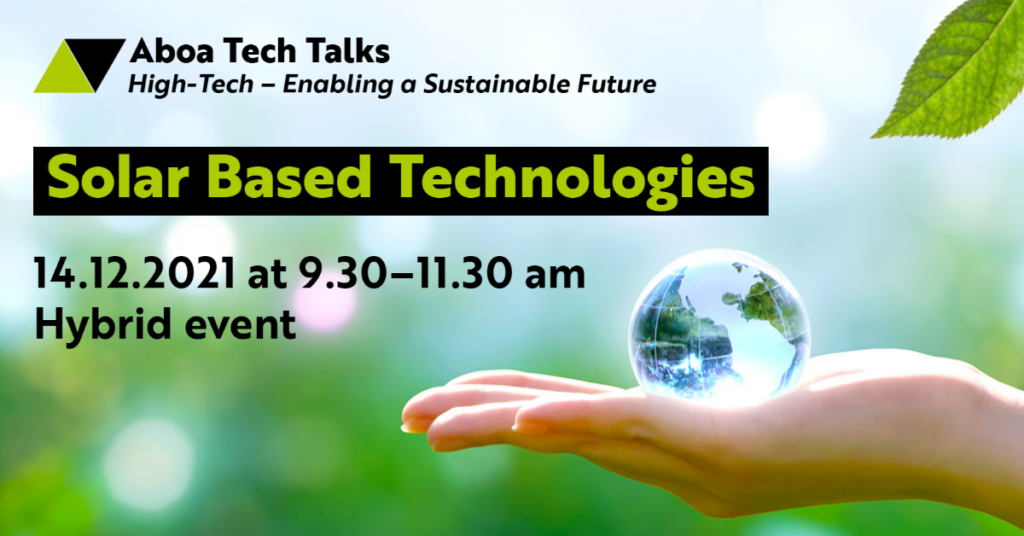26.11.2021
Aboa Tech Talks – Solar Based Technologies
The universities in Turku, in close collaboration with Turku Science Park, have launched a joint Aboa Tech Talks webinar series this autumn focusing on emerging technologies and sustainable development. Aboa Tech Talks aims to highlight advanced and innovative technological research and education carried in the universities that can offer sustainable solutions to the complex global challenges of our time.
The topic of the second Aboa Tech Talks is solar driven technologies and how researchers aim to address the major global sustainability challenges of our modern society. Solar powered technologies harness energy from sunlight, which is a main source of sustainable energy, and transform it into useable form in our daily lives. The goal of these technologies is to develop novel harvesting solutions for solar energy with higher conversion efficiencies. Aboa Tech Talks will stimulate a cooperation between the Universities, facilitate interaction with industry, and promote multidisciplinary education as an enabler of clean solar technology development in the Turku region.
– The universities in Turku have vast expertise on solar-based technologies, including research on natural photosynthesis, different types of solar cells, and sustainability challenges related to solar cells. We have now invited researchers from these backgrounds to share their knowledge with us, says Professor Yagut Allahverdiyeva-Rinne, one of the event organizers.
– We have also invited Miikka Frantti from Solar Group Finland to tell us about photovoltaic business in Finland and how it has seen considerable growth during the past few years, Allahverdiyeva Rinne continues.
Aboa Tech Talks – Solar Based Technologies is a hybrid event and it is free of charge and open to anyone interested, including representatives from industry, government, the third sector, researchers and students. People outside of the four Turku universities (UTU, ÅAU, TUAS, Novia) are invited to attend the event virtually. UTU will moderate the event and the language is English.
The event takes place at 14 December at 9.30–11.30 am at the University of Turku, Main Building, Säästöpankki lecture hall, and online. Click here to register, by 12 December!
Short introduction to the talks:
Eva-Mari Aro
Photosynthesis at the forefront of sustainability
Photosynthesis converts annually huge amounts of solar energy into chemical energy and sustains nearly all life on our planet. Disclosing the structural and functional mechanisms of photosynthetic nanocomplexes provides means to make use of this marvelous machinery to develop technologies to combat climate change and global food shortage. Such approaches at UTU plant molecular biology unit will be introduced.
Miikka Frantti
Photovoltaic business in Finland and R&D cooperation with higher education institutions
Photovoltaic business in Finland has seen considerable growth during the past few years and the future looks very bright as well. Increasing interest of private consumers and businesses in photovoltaic energy keeps the markets going, not to mention recent legislative reforms allowing better use of PV energy in apartment buildings. Domesticity is more and more appealing to customers as they look for ethically and responsibly made products, and not just going for the cheapest systems. Cooperation with educational institutes has also proven to be a valuable asset. It allows companies to improve and expand their business without making significant investments in personnel or equipment.
Kati Miettunen
Sustainable solar energy
Solar energy itself aims to relief one the major global sustainability challenges. The sustainability challenges related to solar energy have been less discussed. Important areas cover materials choices, device lifetime and recycling of devices at the end of life.
Samuli Ranta
Photovoltaic as part of the Nordic energy system
The role of Photovoltaic as an important part of the energy system is growing globally and also in the Nordics. Lower production costs will open up new markets and applications. At the same time, the importance of a high quality production chain will increase to avoid additional environmental impacts and economic losses.
Jan-Henrik Smått
Research on emerging solar cells at ÅAU
Emerging solar cell technologies can potentially become less expensive and energy consuming alternatives to the well-established silicon solar cells for producing renewable energy and thus in combating climate change. This presentation gives an overview of the research on organic, hybrid, and perovskite solar cells at Åbo Akademi University. The focus of the talk is on nanomaterial design as well as on developing new tools for a better understanding of the underlying processes in a solar cell.

